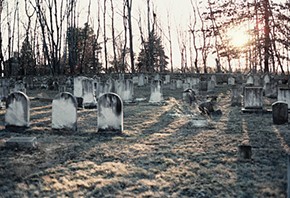Words for grieving

Parish clergy regularly encounter and stand closely with people who are grieving. Sometimes it’s the loss of a spouse or parent after a long and protracted illness. Sometimes death comes suddenly. The minister offers support and comfort and learns that simply being present is often what is most helpful. Clergy also hear what other people say to a grieving person and learn from their efforts how to be helpful.
My friend Kim Bobo, executive director of Interfaith Worker Justice and an occasional writer for the Christian Century, recently lost her husband of 31 years. In an article in the Chicago Tribune she offers advice on what not to say to someone who has lost a dear one, particularly when the death is sudden and unexpected.
Read our latest issue or browse back issues.
There are definitely some comments to avoid, Bobo observes. Avoid saying “God planned it,” for starters, and “God called him home,” “God knows you can handle it” and “God knows that your loved one was ready.” Says Bobo: “Don’t tell someone that it was God’s plan to take our husband and father. We don’t want a God who takes someone like that.”
Avoid saying “I know just how you feel” and following it with the story of your own experience with loss. As Bobo comments: “A grieving person doesn’t want to hear everyone else’s death stories.”
Avoid “These things come in threes,” “Are you going to sell your house?” and “You should . . .” Bobo says that giving advice is annoying.
Instead, acknowledge the pain and shock. “This is horrible and unfair.” Ask “How can I be helpful?” Friends organized Bobo’s e-mails and calls, spruced up her yard, dropped off food and arranged meals for a week.
Finally, share memories of the deceased. A grieving person wants to know that a loved one’s life had meaning and purpose and that the loved one will be remembered with gratitude.
It has been a season of losses. First, Father Andrew Greeley died. He lived across the street from Fourth Presbyterian Church in the Hancock Building. It’s “part of your parish,” he told me. Greeley was a scholar, a novelist, a loyal but always feistily critical Roman Catholic and a priest—his preferred designation.
A few weeks later John Boyle died. A clinical psychologist and minister, he founded and directed Fourth Presbyterian’s counseling center. Boyle was a veteran of World War II’s Battle of the Bulge and a witness to the liberation of Dachau. He studied with Wayne Oates, a pioneer in pastoral psychology. He touched thousands of lives with healing and wholeness and the love of God. After a failed attempt at retirement, he served on the counseling center staff as a pastoral counselor and therapist until a few weeks before he died. His memorial service was deeply meaningful worship; it included great hymns and anthems, a flag ceremony and a bagpiper.
Christian Wiman speaks to such losses in his book, My Bright Abyss: Meditation of a Modern Believer. Wiman was diagnosed with a rare cancer that is currently in remission. As he pondered his own mortality, Wiman asked the big philosophical and theological questions of meaning and human destiny and was drawn to the Christian faith. The result is a stunning Christian witness. Wiman says that he is a Christian not because of persuasive theological argument but because of that moment when Jesus, near his own death on the cross, cried out, “My God, why have you forsaken me?” This Christ, Wiman says, is “God crying I am here, and here not only in what exalts and completes and uplifts you, but here in what appalls, offends, and degrades you.”







